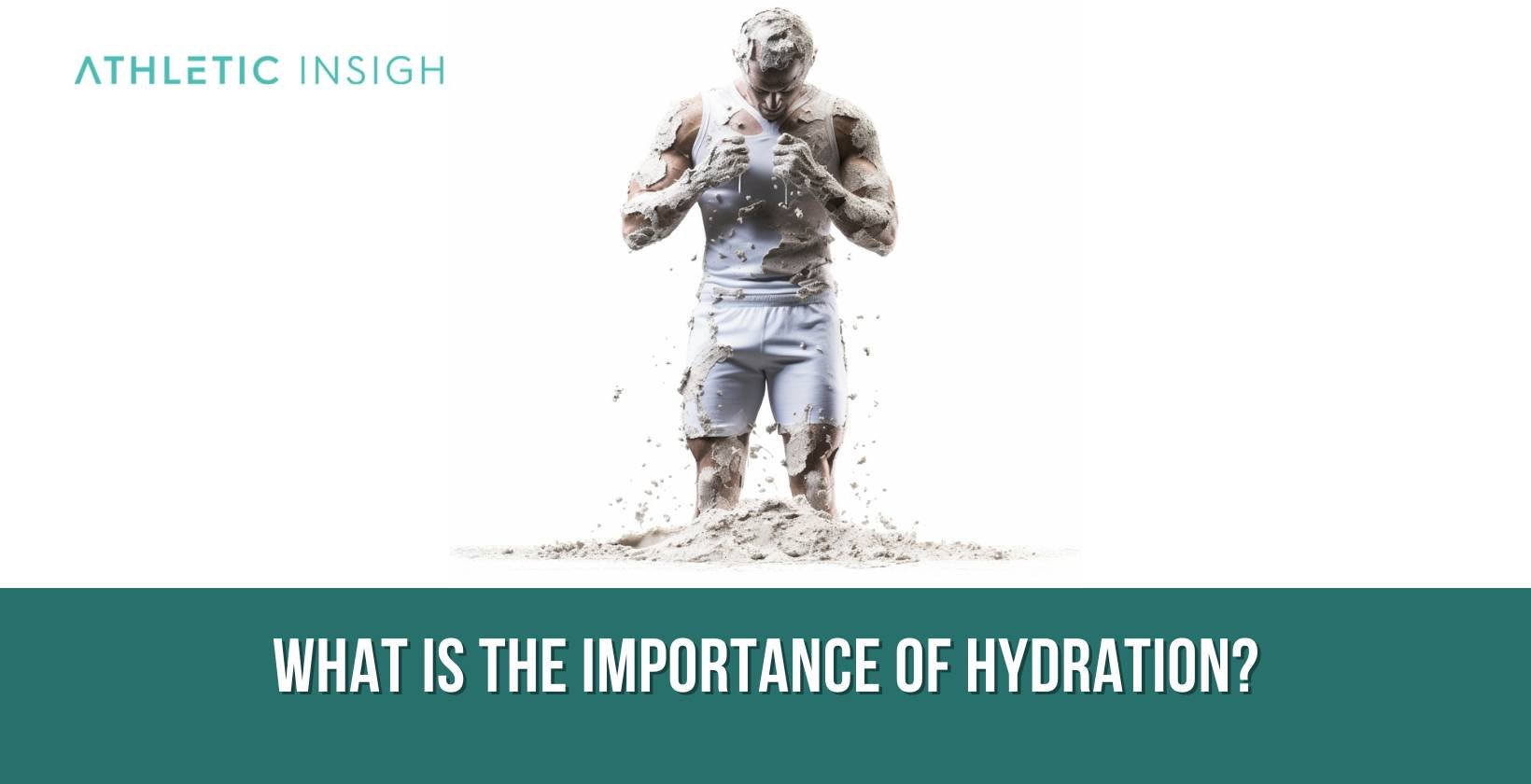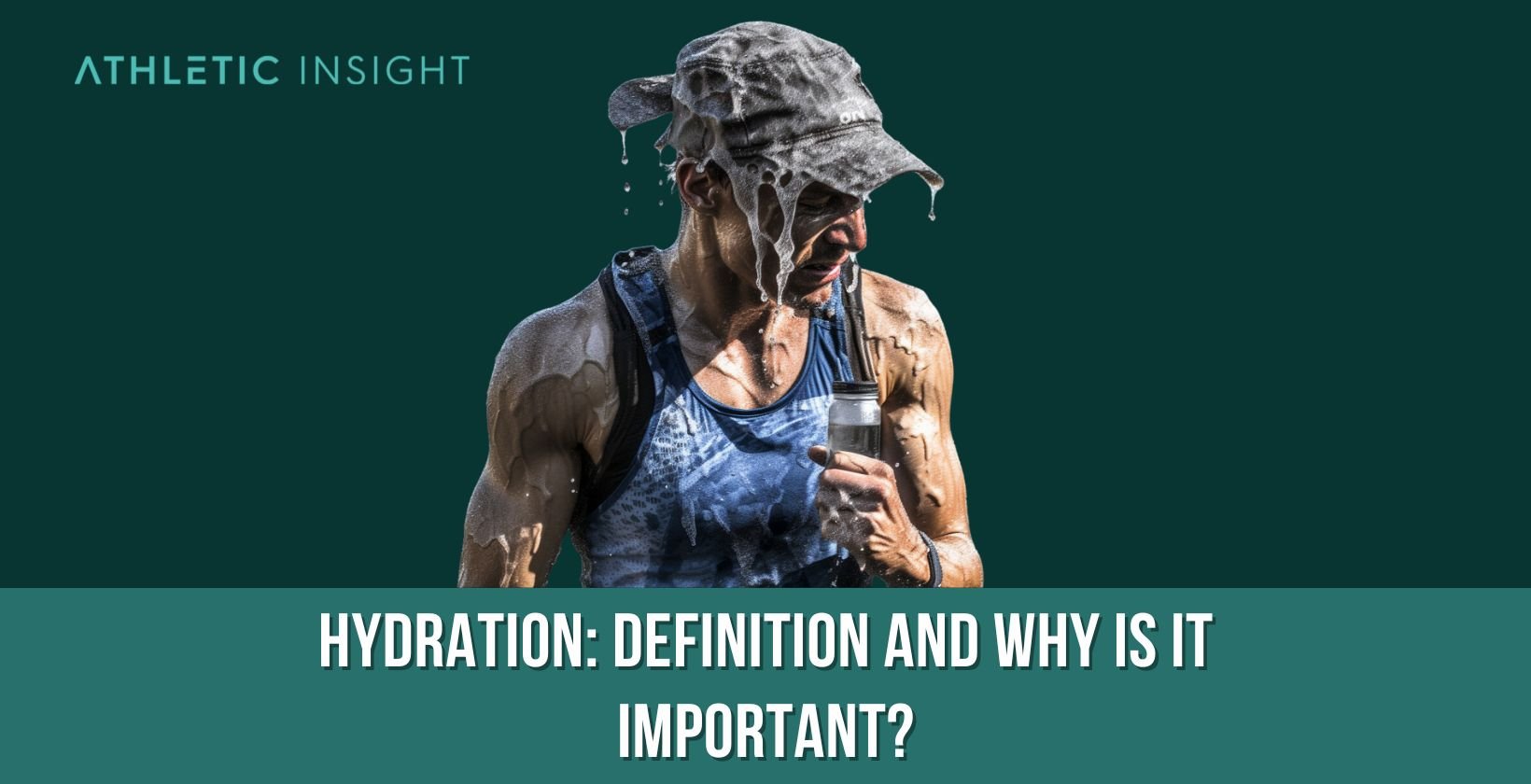Maintaining optimal hydration stands as a fundamental pillar of health, enhancing overall bodily functions and enabling peak performance across a plethora of activities. Hydration is more than mere water consumption; it is the careful balance of fluid intake and loss to sustain life’s array of biological operations. It is crucial not just for athletes, but for anyone striving for healthful living. This article will cover how to stay hydrated and why it is so important when it comes to Athletic Performance.
What does Hydration mean?
Hydration refers to the process by which water is absorbed by the body’s cells and tissues, maintaining the balance of bodily fluids. It is an active, dynamic process where fluids are continually being absorbed, circulated, utilized, and excreted. In its simplest form, hydration can be understood as the act of providing the body with an adequate amount of water to function optimally. Yet, it extends far beyond this definition, impacting everything from brain function to physical performance.
What is the importance of Hydration?
Hydration plays a cardinal role in virtually every function within the human body. It aids digestion, regulates body temperature, lubricates joints, facilitates nutrient absorption, and assists in waste removal. Moreover, hydration is vital for cardiovascular health, as sufficient fluid volume is required to maintain blood flow and pressure. Not only does hydration impact physical health, but it also has profound implications on cognitive function, mood, and overall mental well-being.

How does the body react to Hydration?
When the body receives an adequate volume of water, various physiological mechanisms are triggered. Starting at the cellular level, water aids in the transport of nutrients, enabling cells to produce energy, remove waste, and maintain their structural integrity. On a larger scale, hydration supports the cardiovascular system by ensuring the proper volume of blood, which facilitates oxygen and nutrient transport to working muscles and removes waste products. Moreover, hydration assists the body in regulating its internal temperature through processes like sweating.
Does Hydration restore Electrolytes?
Yes, hydration plays an essential role in maintaining electrolyte balance within the body. Electrolytes are minerals like sodium, potassium, and calcium, which carry an electric charge and facilitate critical bodily functions, including nerve signal transmission and muscle contraction. Consuming water along with electrolytes can help replenish any lost during activities such as exercise, thereby preventing an electrolyte imbalance and sustaining hydration levels.
How can electrolyte imbalance affect hydration levels in the body?
Electrolyte imbalances can significantly impact hydration levels. For instance, a high concentration of electrolytes, primarily due to inadequate water intake, can result in dehydration. This form of electrolyte imbalance is most common.

Conversely, excessive water consumption with inadequate electrolyte intake can lead to a condition known as hyponatremia, characterized by low sodium levels in the blood. Both conditions underscore the necessity of balanced water and electrolyte intake for optimal hydration.
What are ways to stay Hydrated?
Staying hydrated involves more than merely drinking when thirsty. While there are many ways to stay hydrated, here are five effective strategies to start with.
- Consistent Fluid Intake: Make water consumption a regular habit, not just during or after physical activity.
- Consuming Hydrating Foods: Fruits and vegetables such as cucumbers, oranges, and watermelon have high water content.
- Keeping a Water Bottle Handy: Having a water source nearby encourages frequent drinking.
- Rehydrating Post-Exercise: Replenish fluids and electrolytes lost during physical activity.
- Monitoring Urine Color: Generally, a lighter color suggests good hydration.
How to know if you are Hydrated?
The body offers several indicators to gauge hydration levels. Urine color is often the most practical and accessible, with a pale, straw-like hue generally signifying adequate hydration. On the contrary, dark yellow or amber urine may indicate dehydration. Additionally, thirst, while not an early indicator, can signal a need for fluid replenishment. Regular, frequent urination – roughly every 2-3 hours – can also suggest good hydration status.
What are the signs of Dehydration?
Recognizing the signs of dehydration is crucial to address it promptly. The five most common indicators of dehydration are increased thirst, dry mouth, fatigue or dizziness, reduced urination, and headache.
- Increased Thirst: While not the earliest sign, persistent and increased thirst is a notable indicator of dehydration.
- Dry Mouth: The absence of saliva production leading to a sticky, uncomfortable sensation.
- Fatigue or Dizziness: Dehydration can lead to feelings of tiredness or lightheadedness.
- Reduced Urination: Infrequent urination, or dark, concentrated urine can signal inadequate fluid intake.
- Headache: Dehydration can induce headaches due to reduced brain volume from fluid loss.
Why is Hydration important in Sports?
Hydration assumes paramount importance for sports performance and any physical activities. Adequate hydration ensures that the cardiovascular system functions efficiently, supplying working muscles with oxygen and nutrients necessary for performance. Hydration also aids in maintaining body temperature and preventing overheating during strenuous activities.

Dehydration, on the other hand, can impair performance, reduce endurance, and increase the risk of injuries, underlining the importance of hydration in the realm of sports.
How much water should an Athlete need to stay Hydrated?
While individual requirements may vary depending on factors such as body size, sport type, intensity of exercise, and environmental conditions, a general guideline is to consume about 500-1000 ml of water two to three hours before exercise. During exercise, athletes should aim for 200-300 ml every 20 minutes, and post-exercise, they should consume enough fluids to replace any weight loss incurred during the activity.
How does Hydration affect Sports Performance?
Hydration directly influences sports performance. Optimal hydration aids in maintaining blood volume, ensuring efficient circulation and transport of nutrients and oxygen to muscles. Hydration also assists in regulating body temperature and reducing the risk of heat-related illnesses during strenuous activities.
Dehydration can lead to impaired mental and physical performance, including reduced endurance, increased fatigue, and decreased coordination, all of which can significantly impact athletic performance.
What are some good sources of fluids for athletes to stay Hydrated?
Athletes can derive their hydration from numerous sources such as water, sports drinks, fruits and vegetables, milk, and coconut water.
- Water: The most straightforward and accessible choice for maintaining hydration.
- Sports Drinks: Useful for replenishing electrolytes during prolonged, intensive activities.
- Fruits and Vegetables: High water content foods, like watermelon and cucumbers, also contribute to fluid intake.
- Milk: Provides a good balance of carbohydrates, proteins, and electrolytes, useful for recovery.
- Coconut Water: A natural source of electrolytes, particularly potassium, making it a good option for hydration.
Proper hydration, while seemingly straightforward, holds immense complexities and profound implications for health and performance. Understanding its intricacies enables us to better care for our bodies and live healthfully.



